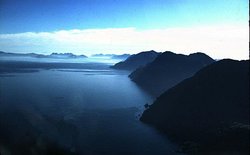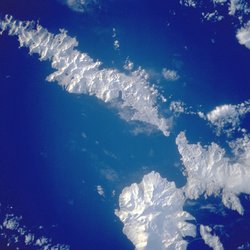Aleutian Islands
|
|
The Aleutian Islands (possibly from Chukchi aliat, "island") are a chain of small volcanic islands forming an island arc situated in the Northern Pacific Ocean, and extending about 1,900 km (1,200 miles) westward from the extremity of the Alaskan peninsula toward the Kamchatka Peninsula. Nearly all of the archipelago is part of the state of Alaska and usually considered as being in the Alaskan Bush, but the extreme western end is part of Russia. The islands are located in the northern part of the Pacific Ring of Fire.
| Contents |
Geography
The islands, known before 1867 as the Catherine Archipelago, comprise four groups— the Fox, Andreanof, Rat and Near Islands. They are all located between 52 degrees and 55 degrees North latitude and 172 degrees East and 163 degrees West longitude.
The axis of the archipelago near the mainland of Alaska has a southwest trend, but near the 129th meridian its direction changes to the northwest. This change of direction corresponds to a curve in the line of volcanic fissures which have contributed their products to the building of the islands. Such curved chains are repeated about the Pacific Ocean in the Kuril Islands, the Japanese chain and in the Philippines. All these island arcs are at the edge of the Pacific Plate and experience lots of seismic activity, but are still habitable; the Aleutians lie between the Pacific and North American tectonic plates. The general elevation is greatest in the eastern islands and least in the western. The island chain is really a western continuation of the Aleutian Range on the mainland.
North-Pacific-air-routes.png
The great majority of the islands bear evident marks of volcanic origin, and there are numerous volcanic cones on the north side of the chain, some of them active; many of the islands, however, are not wholly volcanic, but contain crystalline or sedimentary rocks, and also amber and beds of lignite. The coasts are rocky and surf-worn, and the approaches are exceedingly dangerous, the land rising immediately from the coasts to steep, bold mountains.
The volcano Makushin (5691 ft./1,734.61 m) is visible from Unalaska, and the volcanic islets Bogoslof and Grewingk, which rose from the sea in 1796 and 1883 respectively, lie about 30 miles (48 km) west of the bay.
Climate
AleutianIslands.jpg
The climate of the islands is oceanic, with moderate and fairly uniform temperatures and heavy rainfall. Fogs are almost constant. The summers are much cooler than on the mainland at Sitka, but the winter temperature of the islands and of the Alaska Panhandle is very nearly the same. The mean annual temperature for Unalaska, the most important island of the group, is about 38 degrees Fahrenheit (3.4 degrees Celsius), being about 30 degrees (1.1 º C) for January and about 52 degrees (11.1 º C) for August. The highest and lowest temperatures recorded on the islands are 78 degrees (25.6 º C) and 5 degrees (-15 º C), respectively. The average annual amount of rainfall is about 80 in. (203.2 cm), and Unalaska, with about 250 rainy days per year, is said to be the rainiest place within the territory of the United States.
Economy
The growing season lasts about 135 days, from early in May till late in September, but agriculture is limited to the raising of a few vegetables. With the exception of some stunted willows, the islands are practically destitute of trees, but are covered with a luxuriant growth of herbage, including grasses, sedges and many flowering plants. On the less mountainous islands, the raising of sheep and reindeer was believed to be practicable.
People living in the Aleutian Islands developed fine skills in hunting and basketry. Hunters made their weapons and watercraft. The baskets are noted for being finely woven with carefully shredded stalks of beach rye.
Demographics
The people refer to themselves as Unangan, and have been called "Aleut".
The Aleut language is related most closely to Inuit languages.
Because of the location of the islands, stretching like a broken bridge from Asia to America, many anthropologists believe they were a route of the first human occupants of the Americas. The earliest known evidence of human occupation in the Americas is much further south, in New Mexico and Peru; the early human sites in Alaska have probably been submerged by rising waters during the current interglacial period.
In the 2000 census, there was a population of 8,162 on the islands, of which 4,283 were living in the main settlement of Unalaska.
History
Explorers, traders, colonists, and missionaries arrived from Russia beginning in 1741.
In 1741 the Russian government sent out Vitus Bering, a Dane in the service of Russia, and Alexei Chirikov, a Russian, in the ships Saint Peter (Swiatoj Pietr) and Saint Paul on a voyage of discovery in the Northern Pacific. After the ships were separated by a storm, Chirikov discovered several eastern islands of the Aleutian group, and Bering discovered several of the western islands, finally being wrecked and losing his life on the island of the Komandorski Islands (Commander Islands) that now bears his name (Bering Island). The survivors of Bering's party reached the Kamchatka Peninsula in a boat constructed from the wreckage of their ship, and reported that the islands were rich in fur-bearing animals.
Siberian fur hunters flocked to the Commander Islands and gradually moved eastward across the Aleutian Islands to the mainland. In this manner Russia gained a foothold on the northwestern coast of North America. The Aleutian Islands consequently belonged to Russia, until that country transferred all its possessions in North America to the United States in 1867.
The Russians were ruthless in their expansion, using technology and cruelty to demand tribute and labor from the Aleuts, especially for sea otter hunting. The Russians captured otter pelts from the Aleutian Islands, through the Gulf of Alaska, along the Alaska Panhandle, and south, even to California. Some Aleuts were moved to the Pribilof Islands so that fur seals could be captured there as well.
By 1760, the Russian merchant Adriian Tolstykh had made a detailed census in the vicinity of Adak and extended Russian citizenship to the Aleuts.
Despite some attempts to eliminate slavery and reduce cruel treatment in the 1790s, the Shelikov company depended on the labor of Aleut hunters to collect sea otter pelts.
During his third and last voyage, in 1778, Captain James Cook surveyed the eastern portion of the Aleutian archipelago, accurately determined the position of some of the more important islands and corrected many errors of former navigators.
One of the first Christian missionaries to arrive in the Aleutian Islands was a monk named Herman, who arrived in 1793 with nine other Russian Orthodox monks and priests. Within two years, he was the only survivor of that party. He settled on Spruce Island, near Kodiak Island, and often defended the rights of the Aleuts against the Russian trading companies. He is now known in the Orthodox Church as St. Herman of Alaska.
Another early Christian missionary of the Russian Orthodox Church was Father Veniaminov who arrived in Unalaska in 1824. He was named Bishop Innokentii in 1840 and moved to Sitka. He is now known in the Orthodox Church as Saint Innocent of Alaska.
In 1906 a new volcanic cone rose between the islets of Bogoslof and Grewingk, near Unalaska, followed by another in 1907. These cones were nearly demolished by an explosive eruption on 1 September 1907.
The principal settlements were on Unalaska Island. The oldest was Iliuliuk (also called Unalaska), settled in 1760-1775, with a customs house, a Russian-Greek church, and a Methodist mission and orphanage, and the headquarters for a considerable fleet of United States revenue cutters which patrol the sealing grounds of the Pribilof Islands. The first public school in Unalaska opened in 1883. Adjacent is Dutch Harbor (so named, it is said, because a Dutch vessel was the first to enter it), which is an important port for Bering Sea commerce.
The U.S. Congress extended American citizenship to all Indians (and this law was held to include the indigenous peoples of Alaska) in 1924.
A hospital was built in Unalaska in 1933 by the US Bureau of Indian Affairs.
During World War II, the Aleutian islands were occupied by Japanese forces when Attu and Kiska were invaded in order to divert American forces away from the main Japanese attack at Midway Atoll. The United States, having broken the Japanese military codes, knew that this was a diversion and did not expend large amounts of effort defending the islands. Some Americans were taken to Japan as prisoners of war. Most of the civilian population of the Aleutians were interned by the United States in camps in the Alaska Panhandle. American forces fought the Japanese on Attu and regained control of the islands. See: Battle of the Aleutian Islands.
Monday, June 3, 2002 was celebrated as Dutch Harbor Remembrance Day. The governor of Alaska ordered state flags lowered to half-staff to honor the 78 soldiers who died during the two-day attack in 1942. The Aleutians World War II Campaign National Historic Area Visitors Center opened in June 2002.
The Alaska Native Claims Settlement Act (ANSCA) became law in 1971. In 1977, the Ounalashka Corporation (from Unalaska) declared a dividend. This was the first village corporation to declare and pay a dividend to its shareholders.
Miscellaneous
The Aleutian Islands would likely be an important part of the National Missile Defense system proposed to defend the United States from small ballistic missile attacks.
See also
Initial text from 1911 encyclopedia; has had some updating, revision, and Wikifying, but more is needed, especially on post-1945 history. Have added some civil historyde:Alëuten et:Aleuudid (saarestik) es:Islas Aleutianas fr:Îles Aléoutiennes it:Isole Aleutine gl:Aleutianas nl:Aleoeten ja:アリューシャン列島 pl:Aleuty pt:Aleutas ru:Алеутские острова



